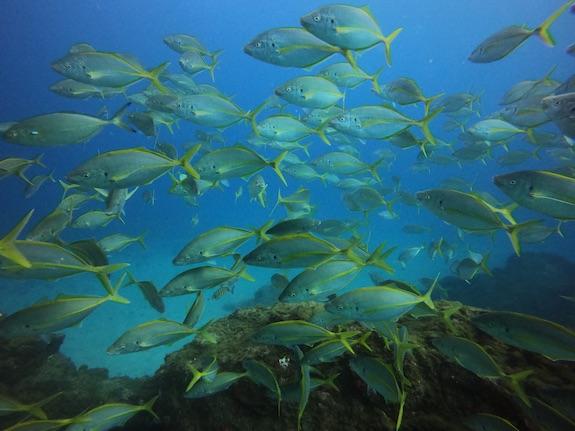New tool gauges impacts of warming waters on over 200 fish species

Credit: Credit: Ludovic Lhotte
Warming ocean waters could reduce the ability of fish, especially large ones, to extract the oxygen they need from their environment. Animals require oxygen to generate energy for movement, growth and reproduction. In a recent paper in the Proceedings of the National Academy of Science, an international team of researchers from McGill, Montana and Radboud universities describe their newly developed model to determine how water temperature, oxygen availability, body size and activity affect metabolic demand for oxygen in fish.
The model is based on physicochemical principles that look at oxygen consumption and diffusion at the gill surface in relation to water temperature and body size. Predictions were compared against actual measurements from over 200 fish species where oxygen consumption rates were measured at different water temperatures and across individuals of different body sizes.
Fish will need more oxygen than their gills can extract from warming water
“Our data suggest that, as temperature increases, the demand for oxygen of many fish species will exceed their capacity to extract oxygen from the environment through their gills,” explains Juan Rubalcaba, a Marie-Curie Postdoctoral Fellow at McGill, and lead author on the paper. “As a result, the aerobic capacity of fish decreases in warming waters, and this reduction may be more important in larger fishes. This tells us that global warming could limit the aerobic capacity of fish, impairing their physiological performance in the future.”
“Water temperature is already rising worldwide as a consequence of climate change and many fish species need to cope with this rapid temperature change, either by migrating toward colder regions or by adopting different life strategies such as shrinking in size over generations in order to avoid respiratory constraints,” said Art Woods, a professor of biological sciences at the University of Montana, and the senior author on the paper. “By including oxygen, this model stands apart by predicting observed patterns of variation in metabolic rate among fishes worldwide than current theories, which focus primarily on body size and temperature.”
###
To read: “Oxygen limitation may affect the temperature and size dependence of metabolism in aquatic ectotherms” by Juan G. Rubalcaba et al in the Proceedings of the National Academy of Science
DOI: 10.1073/pnas.2003292117
The research was funded by the European Commission’s Marie Sk?odowska-Curie Individual Fellowship
About McGill University
Founded in Montreal, Quebec, in 1821, McGill University is Canada’s top ranked medical doctoral university. McGill is consistently ranked as one of the top universities, both nationally and internationally. It is a world-renowned institution of higher learning with research activities spanning two campuses, 11 faculties, 13 professional schools, 300 programs of study and over 40,000 students, including more than 10,200 graduate students. McGill attracts students from over 150 countries around the world, its 12,800 international students making up 31% of the student body. Over half of McGill students claim a first language other than English, including approximately 19% of our students who say French is their mother tongue.
Contact:
Katherine Gombay
McGill Media Relations Office
1-514-717-2289
[email protected]
http://www.
http://twitter.
Media Contact
Katherine Gombay
[email protected]
Original Source
https:/
Related Journal Article
http://dx.




